Distinguished Faculty Service Award
Deadline: January 31st
The Distinguished Faculty Service Award honors a faculty member who has demonstrated
a commitment to the campus-community connection through a life of active, unpaid public
and community service and the integration of service with research and teaching. This
award seeks to honor those faculty who, through their teaching, research, and community
engagement, have made significant contributions that extend beyond the classroom or
campus.
The ideal recipient of this award is an individual who actively integrates service
into their professional practice, inspiring students and colleagues alike through
their dedication to the public good. Through innovative teaching methods, impactful
community-engaged scholarship, and campus-community initiatives, the awardee will
have demonstrated a profound understanding of the role that education plays in addressing
societal challenges. By acknowledging such contributions, this award not only highlights
the importance of service within the academic community but also reinforces the University
of Utah's commitment to fostering civic responsibility and societal impact.
A gift of $1,000 will be made in honor of the award recipient to a nonprofit or charitable
organization of the winner's choice. This gift is made possible by a generous endowment
from Dr. David M. Jabusch, professor emeritus, University of Utah Department of Communication,
and Susan Jabusch.
Anyone at the University or in the community may nominate a faculty member. The recipient
will be honored at an annual celebration and the university commencement ceremony.
Nominations must include the following items:
- A letter that describes the nominee's significant contributions to the community;
- A letter of support from community recipients of the nominee’s service efforts;
- A letter of support from colleagues and/or students who can discuss the nominee’s commitment to service;
- The nominee’s curriculum vitae, with highlights of her/his community service and/or community engagement;
- The nominee’s philosophy of service.
Selection criteria include:
- Evidence that the service contributed is beyond the traditional role of a faculty member;
- Evidence that service has made a positive impact on campus and in the community;
- Evidence of a sustained and long-term commitment to campus and community service;
- Evidence of educational value gained by students through community work;
- Integration of the nominee's service with research and teaching.
When you are ready to apply, please assemble all materials into a single pdf file and email them to Megan Medina by January 31st.
Recipients of the Distinguished Faculty Service Award
 2024: Randy L. Dryer, Presidential Honors Professor (Lecturer) — S.J. Quinney College of Law and Honors
College
2024: Randy L. Dryer, Presidential Honors Professor (Lecturer) — S.J. Quinney College of Law and Honors
College
Randy L. Dryer's service both on and off campus is a testament to his lifelong commitment to community engagement. His volunteer community service has focused on government transparency and addressing the unmet legal needs of underserved persons. Professor Dryer truly shines in his service to the campus community. Prior to receiving his full-time faculty appointment, he served a combined total of 15 years as a member of the University’s Board of Trustees, six as chair or vice chair. After becoming a full-time professor in 2011, Professor Dryer served in several administrative and leadership roles at the University, including President of the University Academic Senate, Acting Dean of the Honors College, and President of the Board of Advisors of the Museum of Natural History of Utah. Professor Dryer’s service has had a profound impact both on campus and in our greater community.

2024: Teresa Molina Avella, Assistant Professor (Lecturer) — College of Social Work and Associate Director, University Neighborhood Partners
In 2013, Dr. Molina expanded the resident-led partnership and with the support of the University of Utah, founded Latino Behavioral Health Services (LBHS) with a mission to “enhance the mental health awareness and well-being of people with mental illness.” From founding partner to board member, researcher and student mentor, Dr. Molina continues her service with LBHS and has been at the forefront of an effort to shift the mental health paradigm from one that diagnoses and treats individual with mental illness, to one that promotes recovery and wellbeing. Dr. Molina has also been engaged with university-community global partnerships. She is one of the founding faculty members of Bridging Borders (BB), a global collective of educators, students and community partners working to create vital networks that lead to innovative opportunities and pathways in education for communities living at or working with those at the margins.
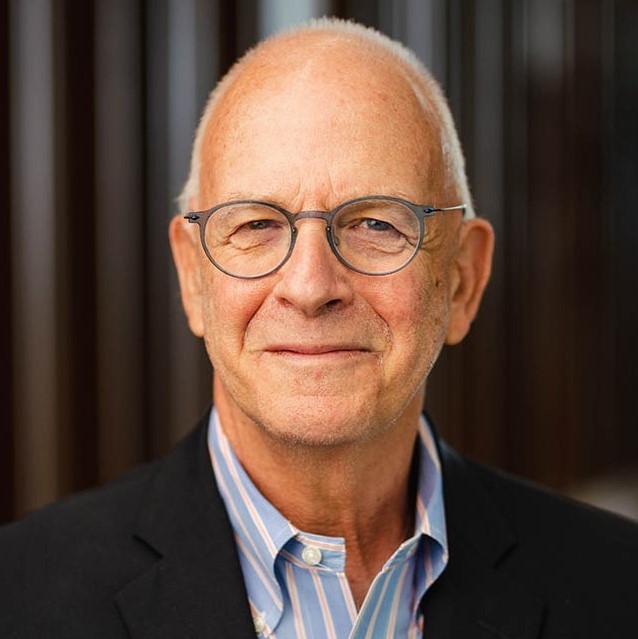 2023: Amos N. Guiora, Professor—S. J. Quinney College of Law
2023: Amos N. Guiora, Professor—S. J. Quinney College of Law
Epitomizing community-engaged scholarship, Professor Guiora’s path-breaking research and writing on Bystanders and Enablers in sexual assaults has had both direct and indirect impacts on survivors worldwide. Beyond his many presentations and discussions with survivors, he advocates for systemic change. He worked with Utah legislators Rep. Brian King and Sen. Kurt Bramble to introduce a bill that criminalized bystanders of sexual assault; the bill was signed by Governor Cox in March 2021. According to one letter of support from a survivor of sexual assault, “Professor Guiora's genuine care and concern aided in realizing my worth, therefore restoring my light. There are very few people in this world that will take the time to listen. Professor Guiora not only listened, he took initiative to create change.”
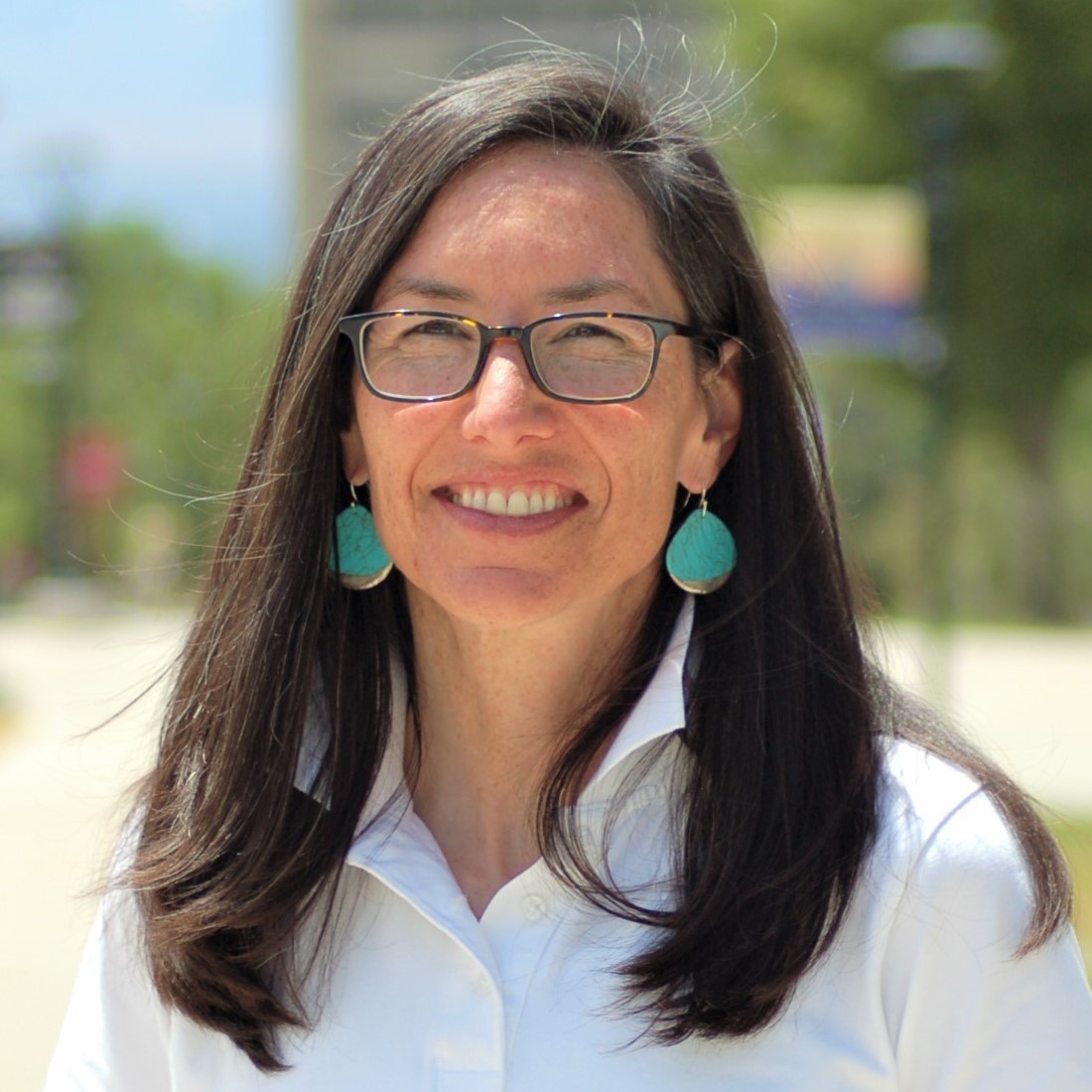
2023: Shannon Jones, Professor—Department of Nutrition and Integrated Physiology, College of Health
Professor Jones turns her passion for food access and justice into action. According to her nominator, “Shannon has taken our programs beyond nutrition education visits, to efforts to change the food environment at shelters, develop gardening programs, and alter state policies on health and nutrition for individuals experiencing homelessness.” All of Professor Jones’s letters of support mentioned her deep commitment to community work. Examples include staying late to finish planting gardens and hand delivering fresh produce via bike on nights and weekends. Of particular note is how she makes space for everyone to engage in the work. “She deeply cares about the people in her life, and this compassion and connection is inextricable from her capacity to mentor community members, students, and faculty about the myriad ways that community engagement and service affects our lives.”
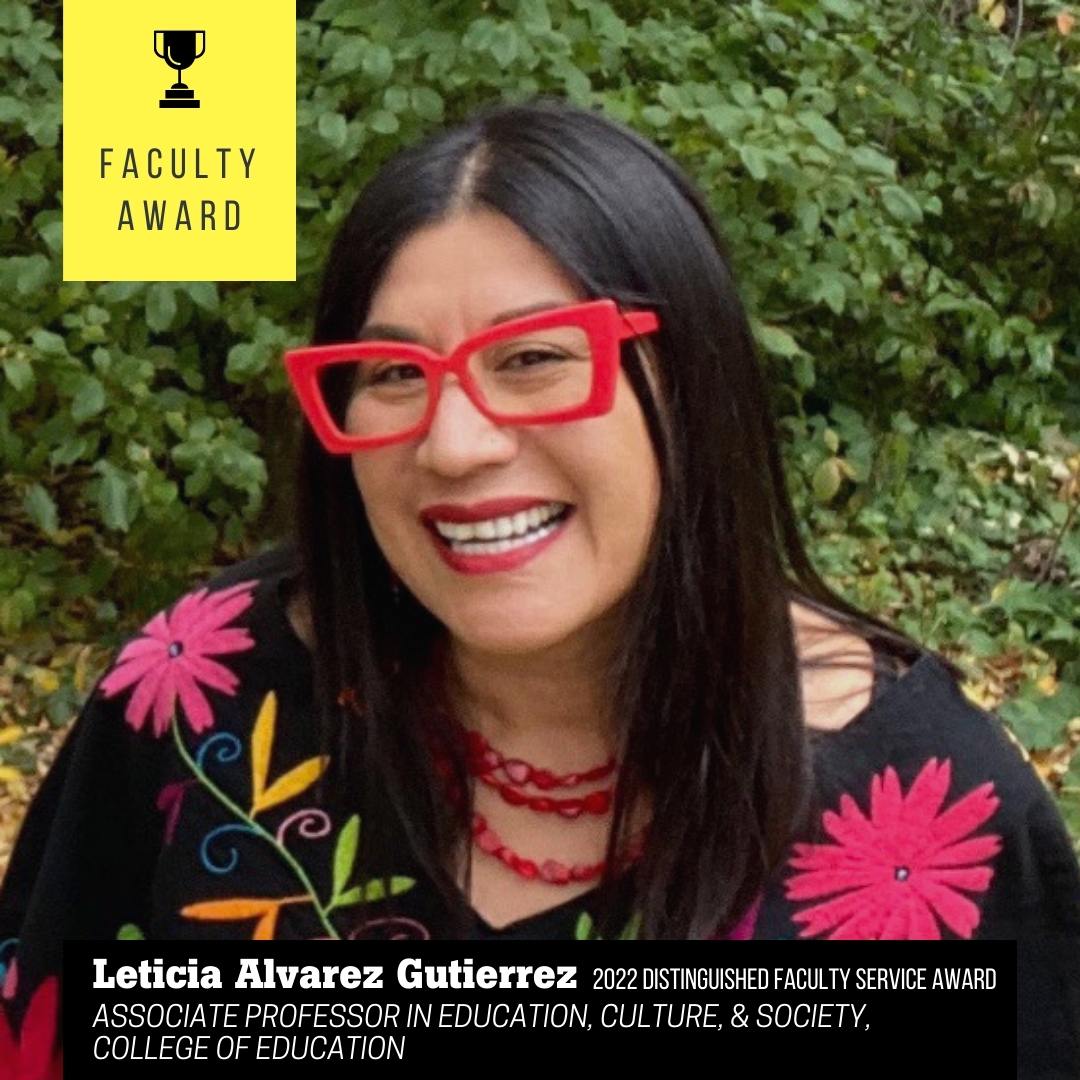
2022: Leticia Alvarez Gutierrez, Associate Professor—Education, Culture, and Society Program, College of Education
Professor Alvarez Gutiérrez has spent her career innovating and implementing equity-focused family-school partnerships and conducting community-based research that, in the words of one of her many community partners, “goes far beyond the scope ofher job for the betterment of our community.” Her consistent excellence in advocating for engagement of culturally and linguistically diverse families in educational decision-making is particularly noteworthy.
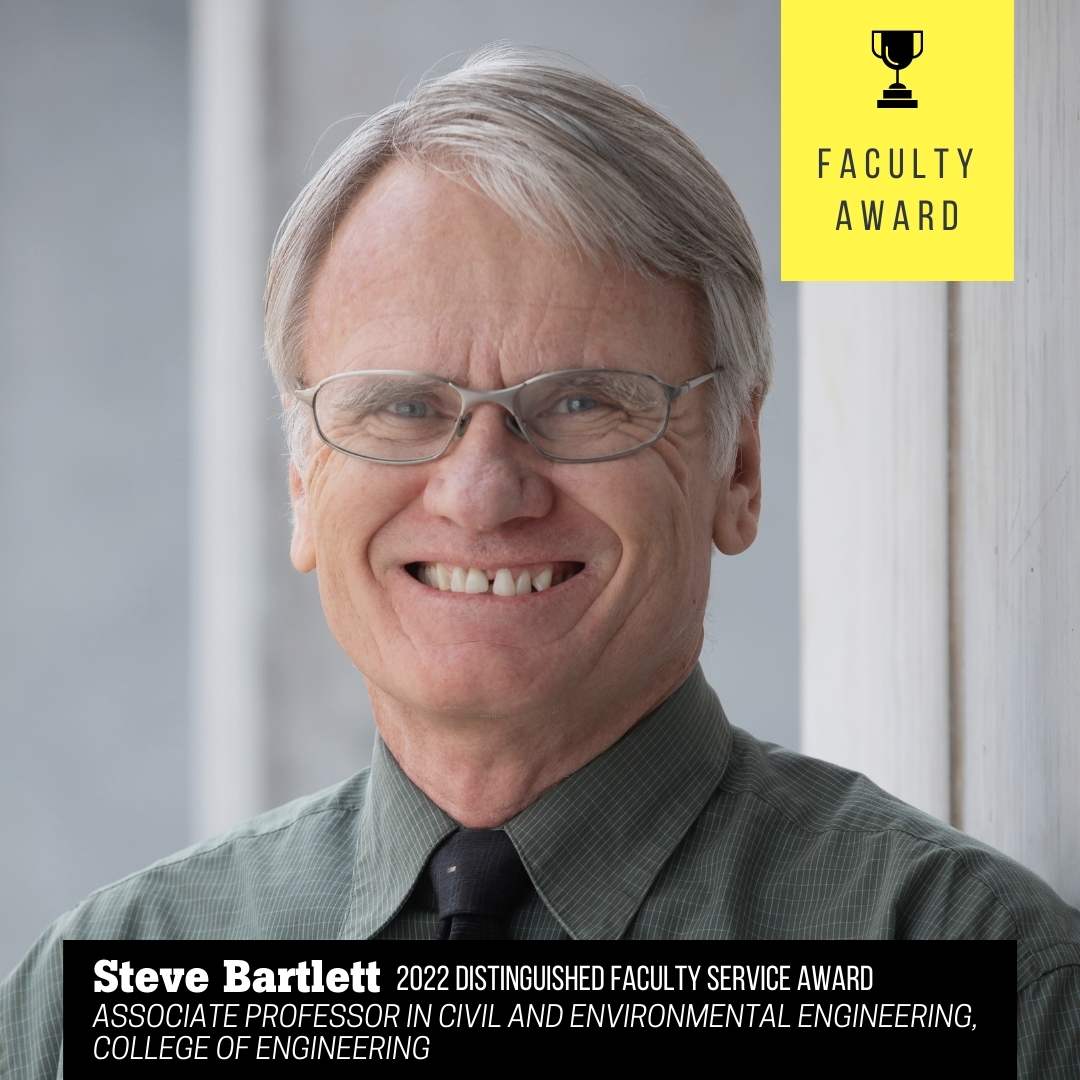
2022: Steve Bartlett, Associate Professor—Civil & Environmental Engineering Program, College of Engineering
Professor Bartlett has an impressive record of facilitating meaningful hands-on experiences for students that meet real public need. According to his College of Engineering colleague, Professor David Eckhoff, Dr. Bartlett’s “ability to immerse students in real-life civil engineering problems” has facilitated deep student and community learning, better prepared students for professional practice, and established lasting connections between the UofU and many community partners.
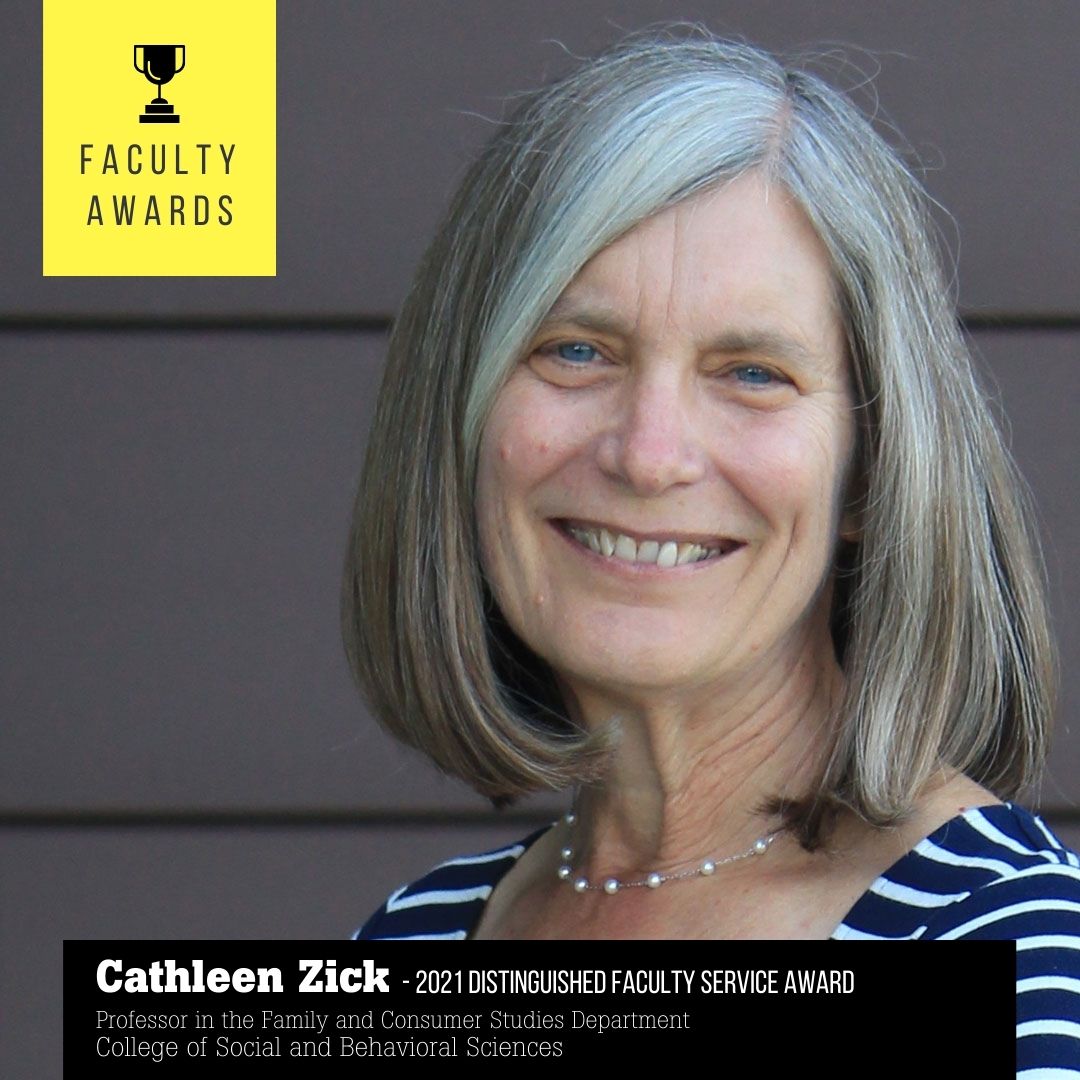 2021: Cathleen Zick, Professor—Family & Consumer Studies Department, College of Social and Behavioral Sciences
2021: Cathleen Zick, Professor—Family & Consumer Studies Department, College of Social and Behavioral Sciences
During her 39 years of teaching and scholarship at the University of Utah, she served as Director of the Masters in Public Policy Program, the Dean of the College of Social and Behavioral Science, and as Department Chair of Family and Consumer Studies. As her nominators shared, Professor Zick’s “integration of research, service, and teaching has provided real and long-lasting relationships” for students and community partners alike. She prioritized investing her “formidable skill set to engage with students, local communities and national stakeholders to improve the lives of those around her in sustained and important service”. It is clear that many citizens of Utah and students at the University of Utah benefitted from her decades of meaningful research and community engagement.
 2020: Andrew Merryweather, Associate Professor—Department of Mechanical Engineering, and Director of the Ergonomics
and Safety Program. Adjunct Associate Professor of both Family and Preventive Medicine
and Physical Therapy & Athletic Training
2020: Andrew Merryweather, Associate Professor—Department of Mechanical Engineering, and Director of the Ergonomics
and Safety Program. Adjunct Associate Professor of both Family and Preventive Medicine
and Physical Therapy & Athletic Training
Andrew Merryweather has established an exceptional research program in musculoskeletal injury biomechanics, and has spent his life promoting safety and health in the workplace and in improving the quality of life for those with complex disabilities. He has collaborated on over 25 project developing assistive devices to allow folks with disabilities to return to sports, gain self-confidence, and participate in activities they never thought possible.
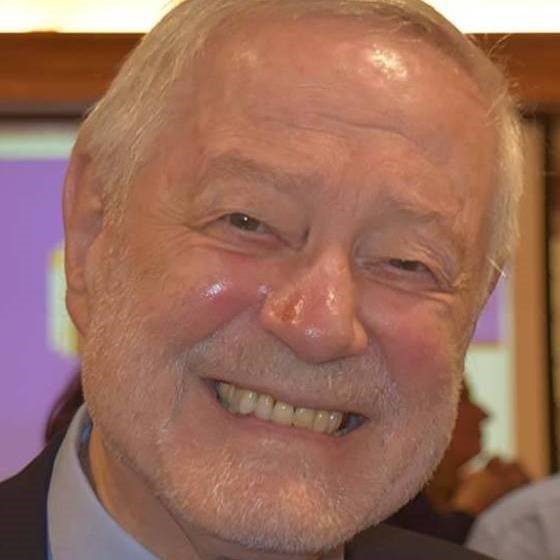
2019: J. Steven Ott, Professor—Political Science/Public Administration, former Dean of the College of Social and Behavioral Science from (2000-2009)
Steve Ott has been at the University of Utah since 1992 and spent his entire career fostering lasting relationships among institutions, diverse communities, and multitudes of students. Dr. Ott also served on the board of the Utah Non-Profits Assocation, creating connections between dozens of NPO's and University of Utah classes. He served as the MPA Director, Director of the Institute of Public and International Affairs and Global Enterprise, using all of these positions to facilitate greater connectivity between students, faculty, and community.
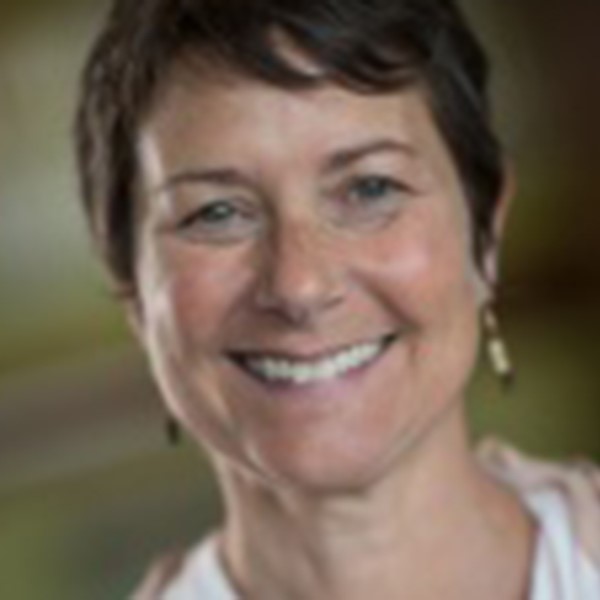
2018: Julie Metos, Assistant Professor—Nutrition and Integrative Physiology; Executive Director of the University of Utah Center for Community Nutrition.
“In my career I have focused on the epidemic of childhood obesity and also the relatively new concept that when you are food insecure you are more likely to be overweight or obese. My interests were more in working with low income folks, where nutrition intersects with social justice,” she says. “I basically try to figure out ways that we can do early prevention for childhood obesity.”
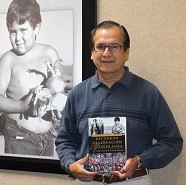 2017: Armando Solorzano—Family and Consumer Studies and Ethnic Studies
2017: Armando Solorzano—Family and Consumer Studies and Ethnic Studies
Dr. Solorzano has worked for nearly three decades to "validate the experiences of disenfranchised or minoritized groups in Utah, to promote dialogue and understanding among different racial groups, to influence public policy, and to incorporate Utah minorities in the state and national research agendas." He created a traveling exhibit, "We Remember, We Celebrate, We Believe: Recuerdo, Celebracion, y Esperanza: Latinos in Utah," that was viewed by more than 110,000 people and later resulted in a book published in Spanish and English. He organized the April 2006 Dignity March in Utah. Dr. Solorzano created the Utah Migrant and Seasonal Farmworkers Council to coordinate the health programs, educational efforts, and legal representation of 20,000 migrant workers in Utah, and he has worked for more than a decade with Even Start Program, which focuses on helping new immigrants integrate into local communities. He is recognized for his commitment to community-engaged learning and inspiring "students to become agents of social change."
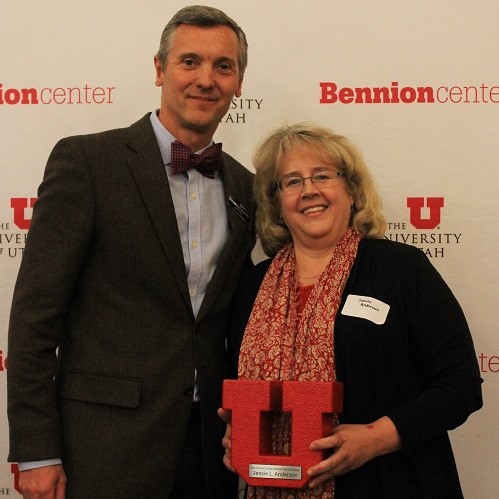 2016: Jensie Anderson—Law
2016: Jensie Anderson—Law
Dr. Anderson joined the S. J. Quinney College of Law in 1999 and soon was asked to help establish the Rocky Mountain Innocence Project, a program to represent individuals who had been wrongfully convicted of crimes. In 2001, Dr. Anderson became president of the board of directors, as well as the primary volunteer attorney for RMIC. As the center grew, she supervised law students who volunteered to investigate cases of possible innocence, obtained funding, hired staff, and recruited volunteer attorneys from private practice. Dr. Anderson also established a community-engaged learning course, Innocence Investigation and Post-Conviction Process, and Innocence Clinic, which enables students to earn credit interning with RMIC.
 2015: Carrie Byington—Pediatrics
2015: Carrie Byington—Pediatrics
Dr. Byington has worked for many years as a physician at the Salt Lake Valley Health Department’s South Main Clinic, which treats minority and underserved women and children. Her work there underscores her belief that all physicians owe a debt of service to their community. She also has given selflessly to others.
- 2014: Hester Henderson—Exercise and Sport Science
- 2013: Patricia Eisenman—Exercise and Sport Science
- 2012: Ronald Smelser—History
- 2011: Marissa Diener—Family & Consumer Studies
- 2010: Luke Garrott—Political Science
- 2009: Janet Kaufman—English
- 2008: Robert Young—Architecture
- 2007: Linda Smith—Law
- 2006: Paul Florsheim—Psychology
- 2005: Barbara Brown—Family & Consumer Studies
- 2004: Cheryl Wright—Family & Consumer Studies
- 2003: Not awarded
- 2002: Carol Werner—Psychology
- 2001: Cheryl Wright—Family & Consumer Studies
- 2000: Robert Huefner—Political Science
- 1999: Kazuo Matsabayashi—Architecture
